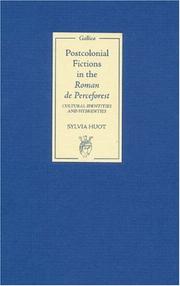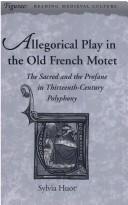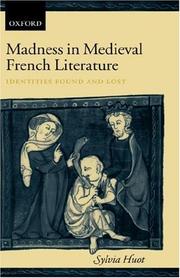| Listing 1 - 10 of 14 | << page >> |
Sort by
|
Book
ISBN: 0801419220 1501746677 Year: 1987 Publisher: Ithaca : Cornell University Press,
Abstract | Keywords | Export | Availability | Bookmark
 Loading...
Loading...Choose an application
- Reference Manager
- EndNote
- RefWorks (Direct export to RefWorks)
As the visual representation of an essentially oral text, Sylvia Huot points out, the medieval illuminated manuscript has a theatrical, performative quality. She perceives the tension between implied oral performance and real visual artifact as a fundamental aspect of thirteenth- and fourteenth-century poetics. In this generously illustrated volume, Huot examines manuscript texts both from the performance-oriented lyric tradition of chanson courtoise, or courtly love lyric, and from the self-consciously literary tradition of Old French narrative poetry. She demonstrates that the evolution of the lyrical romance and dit, narrative poems which incorporate thematic and rhetorical elements of the lyric, was responsible for a progressive redefinition of lyric poetry as a written medium and the emergence of an explicitly written literary tradition uniting lyric and narrative poetics.Huot first investigates the nature of the vernacular book in the thirteenth and fourteenth centuries, analyzing organization, page layout, rubrication, and illumination in a series of manuscripts. She then describes the relationship between poetics and manuscript format in specific texts, including works by widely read medieval authors such as Guillaume de Lorris, Jean de Meun, and Guillaume de Machaut, as well as by lesser-known writers including Nicole de Margival and Watriquet de Couvin. Huot focuses on the writers' characteristic modifications of lyric poetics; their use of writing and performance as theme; their treatment of the poet as singer or writer; and of the lady as implied reader or listener; and the ways in which these features of the text were elaborated by scribes and illuminators. Her readings reveal how medieval poets and book-makers conceived their common project, and how they distinguished their respective roles.
Poetry --- Old French literature --- 840 "12/13" --- Books --- -French poetry --- -Manuscripts, French --- -Manuscripts, Medieval --- -Narrative poetry, French --- -Poetry --- -Scriptoria --- -Songs, French --- -French songs --- Copying rooms --- Writing rooms --- Rooms --- Illumination of books and manuscripts --- Manuscripts --- Monasteries --- Monastic libraries --- Poems --- Verses (Poetry) --- Literature --- French narrative poetry --- French poetry --- Medieval manuscripts --- French manuscripts --- French literature --- Library materials --- Publications --- Bibliography --- Cataloging --- International Standard Book Numbers --- Franse literatuur--?"12/13" --- History --- -History and criticism --- History and criticism --- Editing --- Reproduction --- Philosophy --- Manuscripts, French --- Manuscripts, Medieval --- Narrative poetry, French --- Scriptoria --- Songs, French --- History and criticism. --- Manuscripts. --- History. --- Editing. --- -Franse literatuur--?"12/13" --- 840 "12/13" Franse literatuur--?"12/13"

ISBN: 9781843841043 1843841045 9781846155826 9786612185779 1282185772 1846155827 Year: 2007 Publisher: Suffolk Boydell & Brewer
Abstract | Keywords | Export | Availability | Bookmark
 Loading...
Loading...Choose an application
- Reference Manager
- EndNote
- RefWorks (Direct export to RefWorks)
The 'Roman de Perceforest' explores issues of ethnic and cultural conflict and fusion, identity and hybridity in an imaginary pre-Arthurian Britain, ruled by a dynasty established by Alexander the Great. The 'Roman de Perceforest' was composed about 1340 for William I, Count of Hainaut. The vast romance, building on the prose romance cycles of the thirteenth century, chronicles an imaginary era of pre-Arthurian British history when Britain was ruled by a dynasty established by Alexander the Great. Its story of cultural rise, decline, and regeneration offers a fascinating exploration of medieval ideas about ethnic and cultural conflict and fusion, identity and hybridity. Drawing on the insights of contemporary postcolonial theory, Sylvia Huot examines the author's treatment of basic concepts such as 'nature' and 'culture', 'savagery' and 'civilisation'. Particular attention is given to the text's treatment of gender and sexuality as focal points of cultural identity, to its construction of the ethnic categories of 'Greek' and 'Trojan', and to its exposition of the ideological biases inherent in any historical narrative. SYLVIA HUOT is Reader in Medieval French Literature and Fellow of Pembroke College, Cambridge.
Old French literature --- Perceforest --- Romances --- History and criticism. --- Perceforest. --- Chivalric romances --- Chivalry --- Courtly romances --- French romances --- Medieval romances --- Romances, French --- Romans courtois --- French literature --- Literature, Medieval --- Roman de Perceforest

ISBN: 0804727171 9780804727174 Year: 1997 Volume: *11 Publisher: Stanford, Calif. Stanford University Press
Abstract | Keywords | Export | Availability | Bookmark
 Loading...
Loading...Choose an application
- Reference Manager
- EndNote
- RefWorks (Direct export to RefWorks)
The motet began as a form of sacred vocal music in several parts; a cantus firmus or tenor, drawn from sacred Latin chant, served as a foundation for one or more upper voices. The French motet was a well-established form by the middle of the thirteenth century, as were bilingual motets that combined at least one French and one Latin text among the upper voices. Though some attention is paid to melodic structure and the relationship between text and music, this book focuses on the literary artistry of the texts of French and bilingual motets, notably the special feature of motets that distinguished them from other medieval lyric forms: the phenomenon of polytextuality. The author analyzes both the interaction of the texts within a motet (when there is more than one texted voice) and the relationship between the texted voice(s) and the tenor. Although some French motets employ vernacular refrains as tenors, the vast majority use Latin tenors, thus maintaining an explicit tie to the liturgical origins of the genre. This presence of sacred and profane elements within a single motet presents an interpretive dilemma that the author suggests can be resolved through an allegorical or parodic reading; indeed, she argues that the tension between allegory and parody is an essential feature of the French motet. The book examines the creative juxtaposition of sacred tenors and vernacular lyric motifs, and the resulting interplay of allegorical and parodic meanings, focusing in particular on the female persona as object of desire and as desiring subject, and on the motives of the separation and reunion of lovers. The author's analysis also discusses the links between the French motet and the secular lyric, the allegorization of love poetry in sermons and mystical texts, sacred parody, and the playful use of liturgical and biblical citations in erotic poetry.
Allegorie --- Allegory --- Allégorie --- Music and language --- Music and literature --- Musique et langage --- Musique et littérature --- Muziek en literatuur --- Muziek en taal --- Motet --- Part songs, French --- Part songs, Latin --- Music and literature. --- Music and language. --- Polyphonies françaises --- Polyphonies latines --- History and criticism --- Histoire et critique --- Motets --- Allegory. --- History and criticism. --- Polyphonies françaises --- Musique et littérature --- Allégorie --- Latin part songs --- French part songs --- Part-songs, Old French --- Literature and music --- Literature --- Language and music --- Language and languages --- Choruses --- Part songs --- Part songs, Sacred --- Personification in literature --- Symbolism in literature --- France --- 500-1400 --- Part-songs [French ] --- Part-songs [Latin ] --- Motets - France - 500-1400 - History and criticism --- Part songs, French - 500-1400 - History and criticism --- Part songs, Latin - 500-1400 - History and criticism
Book
ISBN: 1501746685 1501746669 Year: 2019 Publisher: Cornell University Press
Abstract | Keywords | Export | Availability | Bookmark
 Loading...
Loading...Choose an application
- Reference Manager
- EndNote
- RefWorks (Direct export to RefWorks)
Sylvia Huot points out the theatrical, performative quality of thirteenth- and fourteenth-century French illuminated manuscripts.
Narrative poetry, French. --- French narrative poetry --- French poetry --- Poetry
Book
ISBN: 0268081832 0268081816 Year: 2016 Publisher: Notre Dame, Indiana : University of Notre Dame Press,
Abstract | Keywords | Export | Availability | Bookmark
 Loading...
Loading...Choose an application
- Reference Manager
- EndNote
- RefWorks (Direct export to RefWorks)
"Giants are a ubiquitous feature of medieval romance. As remnants of a British prehistory prior to the civilization established, according to the Historium regum Britannie, by Brutus and his Trojan followers, giants are permanently at odds with the chivalric culture of the romance world. Whether they are portrayed as brute savages or as tyrannical pagan lords, giants serve as a limit against which the chivalric hero can measure himself. In Outsiders: The Humanity and Inhumanity of Giants in Medieval French Prose Romance, Sylvia Huot argues that the presence of giants allows for fantasies of ethnic and cultural conflict and conquest, and for the presentation--and suppression--of alternative narrative and historical trajectories that might have made Arthurian Britain a very different place. Focusing on medieval French prose romance and drawing on aspects of postcolonial theory, Huot examines the role of giants in constructions of race, class, gender, and human subjectivity. She selects for study the well-known prose Lancelot and the prose Tristan, as well as the lesser known Perceforest, Le Conte du papegau, Guiron le Courtois, and Des Grantz Geants. By asking to what extent views of giants in Arthurian romance respond to questions that concern twenty-first-century readers, Huot demonstrates the usefulness of current theoretical concepts and the issues they raise for rethinking medieval literature from a modern perspective. "In her beautifully written Outsiders: The Humanity and Inhumanity of Giants in Medieval French Prose Romance, Sylvia Huot organizes a wealth of material into a taxonomy of giants and their complex role in medieval French literature. Huot imaginatively uses that mapping to demonstrate the many ways in which the figure of the giant is a cultural fantasy through which medieval writers imagined the limits of personhood. Tracing that fantasy through medieval concepts of race and ethnicity, Huot makes an original and important claim not just about what giants do for medieval writers or their audiences, but also about the vulnerable boundaries of the human that are both put into question and reaffirmed by representations of giant outsiders." --Peggy McCracken, University of Michigan"--
Book
Year: 1990 Publisher: [S.l.] [s.n.]
Abstract | Keywords | Export | Availability | Bookmark
 Loading...
Loading...Choose an application
- Reference Manager
- EndNote
- RefWorks (Direct export to RefWorks)
Book
ISBN: 9781906540807 1906540802 9781315094809 9781351569187 Year: 2010 Volume: 31 Publisher: Oxford Oxbow Books
Abstract | Keywords | Export | Availability | Bookmark
 Loading...
Loading...Choose an application
- Reference Manager
- EndNote
- RefWorks (Direct export to RefWorks)
Poetry --- Comparative literature --- Thematology --- Old French literature --- Medieval Latin literature --- Literature, Medieval --- Latin literature --- Love poetry, French --- History and criticism --- Influence --- Guillaume, --- Literature, Medieval - History and criticism --- Latin literature - Influence --- Love poetry, French - History and criticism --- Guillaume, - de Lorris, - active 1230 - Roman de la rose
Book
ISBN: 9780268031121 9780268081812 9780268081836 Year: 2016 Publisher: Notre Dame, Indiana : University of Notre Dame Press,
Abstract | Keywords | Export | Availability | Bookmark
 Loading...
Loading...Choose an application
- Reference Manager
- EndNote
- RefWorks (Direct export to RefWorks)
Giants are a ubiquitous feature of medieval romance. As remnants of a British prehistory prior to the civilization established, according to the Historium regum Britannie, by Brutus and his Trojan followers, giants are permanently at odds with the chivalric culture of the romance world. Whether they are portrayed as brute savages or as tyrannical pagan lords, giants serve as a limit against which the chivalric hero can measure himself. In Outsiders: The Humanity and Inhumanity of Giants in Medieval French Prose Romance, Sylvia Huot argues that the presence of giants allows for fantasies of ethnic and cultural conflict and conquest, and for the presentation-and suppression-of alternative narrative and historical trajectories that might have made Arthurian Britain a very different place. Focusing on medieval French prose romance and drawing on aspects of postcolonial theory, Huot examines the role of giants in constructions of race, class, gender, and human subjectivity. She selects for study the well-known prose Lancelot and the prose Tristan, as well as the lesser known Perceforest, Le Conte du papegau, Guiron le Courtois, and Des Grantz Geants. By asking to what extent views of giants in Arthurian romance respond to questions that concern twenty-first-century readers, Huot demonstrates the usefulness of current theoretical concepts and the issues they raise for rethinking medieval literature from a modern perspective
Old French literature --- Thematology --- Romances --- French literature --- Giants in literature --- Outsiders in literature --- Civilization, Medieval, in literature --- Arthurian romances --- History and criticism

ISBN: 0199252122 9780199252121 0191719110 Year: 2003 Publisher: Oxford : Oxford university press,
Abstract | Keywords | Export | Availability | Bookmark
 Loading...
Loading...Choose an application
- Reference Manager
- EndNote
- RefWorks (Direct export to RefWorks)
Madness is a frequent theme in medieval French literature. It afflicts the two greatest heroes of the Arthurian world, Lancelot and Tristan, as well as numerous other knights and unlucky lovers in courtly tradition. It also appears in devotional literature, whether in the form of the 'holy fool' who impersonates madness as a kind of penance or in the motif of lunatics cured through the miraculous intervention of a saint. These texts manifest a wide range of attitudes towards madness, which may be associated with nobility and refinement of character, with chivalric or spiritual transcendence, with tragic illness and impairment, with comic ineptitude, or with sin and degradation. Tracing these various depictions allows for a study of how and why madness is used in different texts and different genres. This new book, from one of the leading critics in medieval studies, ties in with contemporary interest in the politics of identity, and literary constructions of identity. There are many studies of gender, sexuality, race and ethnicity, and class in medieval literature and society, but far fewer of madness. Yet madness is the ultimate 'queerness' or 'otherness', the limit of the human condition. Madness has been identified as an important topic in feminist criticism, but has been explored largely with regard to nineteenth- and twentieth-century studies. The cultural significance of madness in the Middle Ages is often misrepresented in contemporary discussions. Sylvia Huot redresses that imbalance.
Old French literature --- Thematology --- French literature --- Mental illness in literature --- Criticism and interpretation --- Themes, motives --- Mental illness in literature. --- History and criticism. --- Criticism and interpretation. --- Themes, motives. --- French literature - To 1500 - Criticism and interpretation --- French literature - To 1500 - Themes, motives
Book
Year: 1982 Publisher: Place of publication unknown Princeton University
Abstract | Keywords | Export | Availability | Bookmark
 Loading...
Loading...Choose an application
- Reference Manager
- EndNote
- RefWorks (Direct export to RefWorks)
| Listing 1 - 10 of 14 | << page >> |
Sort by
|

 Search
Search Feedback
Feedback About UniCat
About UniCat  Help
Help News
News